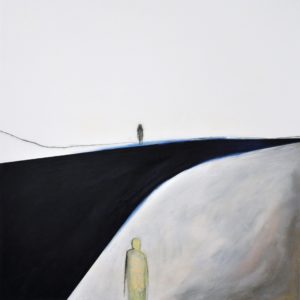Hitchhiking
May 2018
It’s a tricky thing, leaving St John’s. And here, I’m talking solely in terms of travelling logistics. Sure, people do it all the time – they board planes, or maybe they drive those 900 kilometres to Port-aux-Basques (while gritting their teeth, probably, at ever-rising ferry costs), and settle in for the seven-hour boat ride. And then, after all that, they’ll be in North Sydney. The very edge of the rest of the country.

Mike Gough. Waiting on the Shoreline, mixed media on panel, 30″ x 30″, 2016
Incidentally, Cape Bretoners seem to visit Newfoundland pretty rarely – at least, judging from some exchanges I had while living three months in Sydney. At first, I was startled that our island neighbours had seldom ventured this way. But when I thought about it some more, the cost of the ferry and the long drive at the end of it started to seem like reasonable deterrents. And on a vaguely related note, I was also told that Cape Bretoners sometimes liked telling Newfie jokes.
“Really?” I’d ask, wondering whether to say why this wasn’t Exactly Cool.
“Yes. But you guys tell Cape Breton jokes, don’t you?”
Do we? This remains a mystery to me. Had our fervent debates on the topic not even reached the next province over? Quite possibly. And what might this say about Newfoundland’s ongoing isolation? Anything? To me, the rest of Canada often feels impossibly distant, even if it’s 2018 and Google is our overlord. But has it always been this way? We hear about the outports of the olden days, with their diverging dialects and hyper-local particularities – but how isolated was everyone, really?
*
In his poem “Isolation,” David Benson hones in on this topic, arguing that in fact, it was easier to travel in the past. He writes:
We build this island
around the wash of the Great Bays,
scorning overland travel,
preferring perhaps the security of boats. …
Isolated?
Our Grandfathers travelled more than we do.
Persian rugs and Greek urns
adorned front rooms of houses
where women scanned the sea
with German telescopes for their return; …
They rowed across Fortune Bay in five hours or so.
Now we go by car and it takes us ten.
For my own research on hitchhiking in Newfoundland, I stumbled on many historical instances of people travelling about that appear to support this sentiment. As Benson points out, there were Grandfathers (and Fathers and, well, men) working as sailors, who were thereby able to travel around the world. But there were also people poking around the St John’s harbour front in the 1950s, hoping to hitch a lift to England. Maybe they’d have to sail to Montreal first, or even do a Montreal-Halifax stopover before the big crossing. But if you played your cards right, you could hitchhike the Atlantic Ocean.
There’s some documentation of people hitchhiking by boat around the coast of Newfoundland, too. Kathleen Corry Hodgson, an American working for Sir Wilfred Grenfell’s mission in Labrador, wrote an article in 1948 called “Six Weeks Hitch Hiking by Motor Boat.” Hodgson’s task was to determine the “real situation” in White Bay (located on the eastern side of the Northern Peninsula), which was the mission’s most poverty-stricken region at the time. So to see how everyone was really doing, Hodgson travelled from outport to outport by hitching rides in fishermen’s motorboats. All in all, Hodgson writes, she “travelled in 30 different boats and stayed in 19 fishermen’s houses as well as a couple of merchants’.” Her adventure seems to have gone pretty smoothly.
Although Hodgson was an outsider who, moreover, could grant clothing and supplies to those who treated her kindly (at one point, she was rowed the two miles from Sop’s Island to Sop’s Arm “by two young fellows of 11 and 9, who thereby earned clothes to wear to school this winter”), she probably wasn’t the first person asking to be rowed across a bay.
*
Leaving hitchhiking aside for a minute, there’s also the fact that when the ocean is your only way out, it’s going to be the place of joyriding, too. For example, Louis J Chiaramonte’s 1970 ethnography of a coastal community on the south coast of the Island (which remains unconnected by road to this day) describes how teenagers travelled by dory to meet each other. “Young unmarried men and women visit nearby communities almost every weekend,” Chiaramonte writes, and “if, during the winter months, a big dance is held, two dories filled with teenagers might leave in the early part of Saturday evening.” Entertainment, too, arrived via boat. In “Travelling the Outports: Two Studies in Newfoundland Itinerant Culture,” folklorist Michael Taft writes about the adventures of musicians and “travelling moviemen” from the 1920s to 1950s, who tended to show up without warning in motorboats. And according to Taft, vaudeville performers, carnivals, magicians, and hypnotists were also playing the outports since “at least” the turn of the 20th century.
And there used to be trains! Public transit stretching all the way across the Island! Imagine. The railway was cut in 1988, the year before I was born, and maybe because of this, trains and their infrastructure seem both dreamy and almost anachronistic to me. So really, any kind of train transit seems terribly exciting – but it seems even more exciting still to think of people trainhopping across Newfoundland, or “Hitchhiking Via the Railway,” as one archival source put it. In her folklore paper from 1983, student Elizabeth Stanley-Dalton explained the custom:
“Apparently it was quite common for people to jump on a boxcar in St John’s and take a trip wherever. For some it was just something to do, while others used it as a form of transportation. Many of those people would come knocking on doors looking for a bit to eat. Neither my mother or Nanny Stanley ever turned a soul away.”
You could hitchhike a horse and cart, too. Joseph R Smallwood did it when he walked (most of) the railroad track in 1925. And a hitchhiker I interviewed was picked up in the 1970s by a horse and cart on the Southern Shore, even if she was travelling at a speed of “clip, clop, clip, clop, going nowhere.” But after about “oh, ten minutes of that,” the hitchhiker said, “I was just like, I’m never going to get back to St John’s, so I thanked him and walked back to Port Kirwan.”
I guess the automobile does have some advantages. Speed, at least? They’re faster than horses, it’s true. But is it any easier to leave this place these days, or even visit the next Bay over? It might be the argument of a Luddite or contrarian, but I think it’s worth wondering about.



